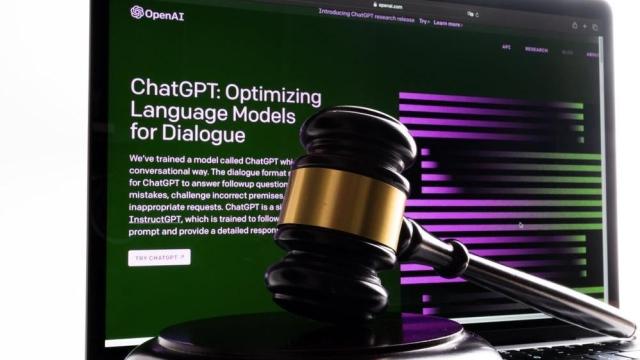OpenAI is facing a potential lawsuit from The New York Times for an intellectual property debate over alleged copyright violations, sources told NPR on Wednesday. The news outlet claims OpenAI, the owner of ChatGPT, is using the Times’ content to train its chatbot.
The Times started negotiations with OpenAI for months to reach a licensing agreement allowing the company to incorporate the paper’s stories into its AI tools. However, the discussions quickly took a turn for the worse as the news outlet raised concerns that ChatGPT would replace journalists, making it a direct competitor.
OpenAI could become a popular search tool for readers by generating information based on original reporting, driving more readers away from news outlets, and directing them to the AI tool instead. The Times is reportedly considering taking legal action in response to this possibility, saying ChatGPT has already used its data to generate paragraphs of information without the paper’s permission.
It remains unclear whether OpenAI has violated copyright laws. Such a case would see the Times venturing into uncharted waters on a number of fronts. For instance, OpenAI could be ordered to remove the Times’ data from its training model, a move that’s probably impossible without retraining ChatGPT on a new dataset—a very expensive process.
“If you’re copying millions of works, you can see how that becomes a number that becomes potentially fatal for a company,” Daniel Gervais, the co-director of the intellectual property program at Vanderbilt University who studies generative AI, told NPR which first reported on the potential lawsuit. “Copyright law is a sword that’s going to hang over the heads of AI companies for several years unless they figure out how to negotiate a solution.”
If The Times files the lawsuit against OpenAI, the company could face financial penalties if it’s found to have violated copyright law, facing upwards of $150,000 per copyright infringement.
OpenAI did not immediately respond to Gizmodo’s request for comment.
OpenAI’s developments have raised concerns about effectively replacing writers in recent months, resulting in several lawsuits already filed against the company. Comedian Sarah Silverman sued OpenAI last month, claiming it used copies of her book, The Bedwetter, to feed its AI chatbot, alleging it infringed on her book’s copyright.
She is one of three authors suing the company, all of whom claim they didn’t give OpenAI permission to obtain information from their books. The other writers include Christopher Golden, who authored Ararat, and Richard Kadrey, author of Sandman Slim.
Other news outlets have criticized OpenAI for illegally using their articles to train the chatbot, including News Corp. which owns the Wall Street Journal. News Corp’s CEO Robert Thomson spoke on the outrage OpenAI faced from journalists and news outlets at a media conference in May. He said: the “[media’s] collective IP is under threat and for which we should argue vociferously for compensation,” the Financial Times reported. He added: AI was “designed so the reader will never visit a journalism website, thus fatally undermining that journalism.”
The New York Times hasn’t confirmed if has decided to file the lawsuit against OpenAI and did not immediately respond to Gizmodo’s request for comment.
